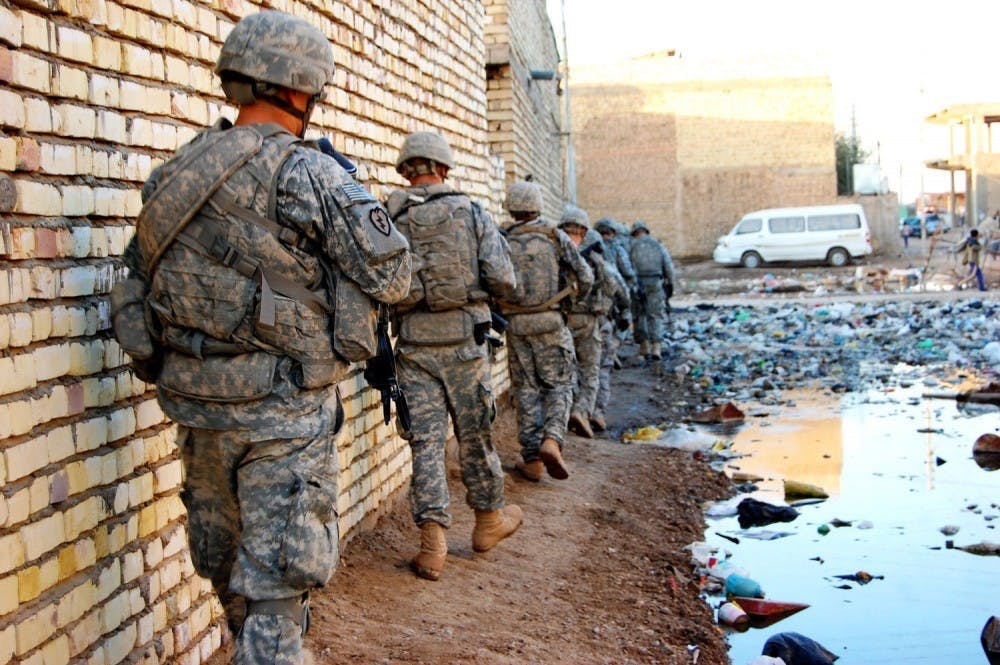In the wake of the airstrike of Qasem Soleimani in early January, I am dismayed to see so many of my peers use the chickenhawk argument. According to Merriam-Webster, this term describes a person who “strongly supports or promotes warlike policies, but who has never served in the military.” People who support the airstrike are regarded as wanting another Middle Eastern war and are told to go and enlist to defend their position. Others say that politicians should volunteer their own sons and daughters before supporting a hawkish position. This concept is not new. In 2005, Christopher Hitchens, while defending the Iraq war, was shouted down by his opponent as being “ready to fight to the last drop… of other people’s blood.” It is a time-tested ad hominem attack that hinges on the belief that only the people who personally bear the consequences of war understand its true costs and are therefore the only ones qualified to decide if a foreign entanglement is worth it.
While combat might give you a new perspective on the personal side of war, it does not automatically grant you the geopolitical wisdom needed to make military decisions. If it did, wouldn’t all of our generals and foreign policy experts be infantrymen? Additionally, if a lack of military experience makes a person overeager for war, the same argument could be made in reverse — that those who have suffered the ravages of war become too risk-averse to make sound decisions.
Nevertheless, even if combat experience did grant such knowledge, it goes against democratic values to exclude people from having a say in the national security concerns that affect us all. Since only 7.3 percent of Americans have ever served, the premise of this argument would keep a huge chunk of society outside of the decision-making process. Included in that list would be those that aren’t medically qualified to join, those who are past the age of enlistment and, up until recently, women. It follows that since they have no skin in the fight, they ought not to weigh in if they are for initiating or escalating military action. Interestingly, there is no such restriction for those that oppose military action.
To better understand, we must test how far we can push this argument. Even taking those who are in the military, only a minority of them serve in combat positions. Going further, we could even divide that number into those that are deployed in dangerous locations versus those that are stationed in Germany and Kuwait. Soldiers that are deployed in the bad part of Iraq versus the “less worthy” good part. Those that work outside the wire versus those that work inside. The final say, however, should go to the soldier on that side of the rock versus the soldier on this side. If this sounds ridiculous, it should. This is the natural progression of the chickenhawk argument.
If taking the argument to its logical extreme isn’t enough, imagine applying its concepts to any other aspect of society. Suppose there is a new metro system proposed for a city. Well, unless you personally join the workers who have to build it, don’t be so eager to speak on this issue. You want this country to become more green? By all means, sell all your worldly possessions and roam the woods an ascetic, carbon-free and guilt-free. You want better policing in a crime-ridden neighborhood? Please, feel free to wear the badge yourself before you start committing others to a cause you won’t participate in yourself. While this article is not a treatise on the merits of any military action, it should demonstrate that the chickenhawk argument is an emotional fallacy and an example of gatekeeping of the highest order.
Additionally, proponents of the chickenhawk argument often make the claim that people other than the hawkish politicians in Washington are forced to fight wars that are not their own. However, those that favor military action are not sending any unwilling participants anywhere. The U.S. switched from a conscription-based military to an all-volunteer one in 1973. This means that every single person serving today chooses to join the military and accept the risks of their own accord, whether it be for patriotism, college or other benefits. I believe this is a welcome advancement of our country because now citizens can make tough decisions on military action unfettered by the thought that someone is being forced to fight someone else’s war. This has also meant that our country now has to work hard to make military service worth it, offering higher wages, restructuring labor and emphasizing esprit de corps over punishment.
Serving in the military does not grant any special knowledge on foreign policymaking. And even if it did, we live in a country where elected officials, not generals, get to dictate our policy. National security is a concern for all citizens, regardless of their willingness to serve. After all, every citizen funds the military through our tax dollars, and it is from our ranks that we fill the military. In return, the military is a servant to the public, and our discourse should reflect that. Ultimately, arguments for military action should be judged on their own merits, not on who makes them.
Apurva Shrestha is a third-year in the College of Arts & Sciences.







